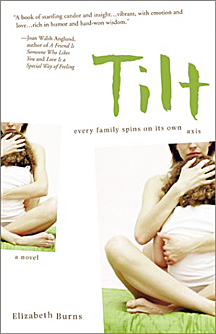Book Review: “Tilt” by Elizabeth Burns
"Tilt" is published by Sourcebooks ($22). This review is republished by permission from Rain Taxi, an Alternative Press Award-winning quarterly magazine published in Minneapolis.

An autistic child. A manic-depressive husband. A cousin and father dead from cancer. A struggling mother transported from New York to Minneapolis, where she knows no one. Tilt could make for very morose reading, but in fact the only time I found tears in my eyes was reading about Bridget’s 39th birthday, when she wakes to find 39 flamingos on her lawn, each wearing a bra, compliments of her Mother’s support group: “White bras, black ones, pink ones, tiny sexy padded and pink, like the kind I haven’t worn since I was twelve. And the old lady support variety, with which I am too intimate.”
Selecting almost any passage at random, one can find this sort of absorbing imagery. The trick to creating uplifting art out of a depressing situation seems to be Burns’s sense of pacing. This is a disjointed narrative, flitting about between past and present; juxtaposed memories from various times in her life help break up the gloom. “I want to tell the story in order, but I remember things in parts. And I replay things in slices, backwards,” Bridget states near the start of the book. Chapters are broken into short, imagistic sections, permitting her to present the reader with enough of the situation to see it clearly, yet not bemoan or lament her state.
Cancer has been written about before, and manic depression has been overplayed in recent works, but it’s the combining of these two with autism which makes the difference here. Autism (“oughtism”), the need for a language beyond words, interplays with the needs of all sensitive people for something, some way of expressing or seeing, beyond the usual:
I want to do anything for Maeve, keep her from being locked inside the world of vision and sound where everything is distorted, where she sees specks floating in people’s eyes, where she can hear the toaster toasting, her own blood flowing, can feel her toes rubbing against her socks. I think that’s what happens. I think it must hurt.
Unfortunately, in the last quarter of the book, our quirky narrator attempts suicide and is hospitalized, and it’s more than just Bridget falling apart, it’s the structure of the book itself. The imagery dries up or becomes predictable: “Do you know what it feels like to want to die every day? Or am I too morbid for you? Hell, I’m too morbid for me.” Nothing matters except rushing toward an inevitable and all-too-easy conclusion. Many novels, including those by seasoned novelists, go on too long, trying to tie things up in neat little packages—I just hadn’t expected it here, and having read this far with great expectations, it disappoints all the more. Still, Tilt is a first novel which exhibits rare maturity, and Elizabeth Burns a writer to watch.
Rain Taxi publishes reviews of a broad spectrum of world literature. You can subscribe to Rain Taxi, or find it at bookstores around the state.